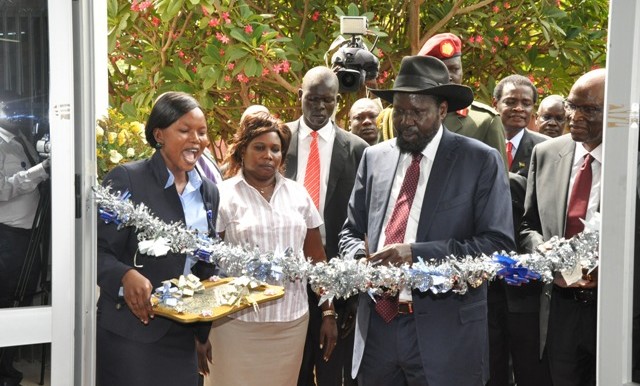President Salva Kiir in speeches yesterday defended the government’s ‘Letter of Credit’ system for giving dollars to certain traders at preferential rates in spite of widespread shortages of dollars in the market. However, he admitted corrupt practices within the central bank without giving many specifics.
South Sudan’s government gives preferential treatment to dozens of companies allowing them to buy dollars at the official rate of about 3 SSP for 1 USD. Most citizens in South Sudan are unable to access dollars at this rate and instead buy at the black market rate of more than three times that amount.
Although the central bank has the power to adjust the official rate so that it aligns with the street rate, it has opted not to do so.
In a speech to parliament yesterday, Kiir said that the preferential treatment for certain companies is beneficial for the economy because it allows them to bring in goods at lower cost. “A credit line from the Qatar National Bank (QNB) was successfully negotiated to help traders import essential commodities at low cost,” he said.
Kiir acknowledged that “Some unprincipled and corrupt individuals have abused the system,” but he contended that he had ordered the finance ministry to “make effective changes and dismiss those involved in abusing the facility.”
This suggests that he continues to support the country’s current monetary policy and the letter of credit system.
He added, “We have dismissed those who were entrusted with the management of the concerned agencies and we will do it again if anybody attempts to violate my directives to reform the letter of credit (LC) system.”
This may have been a reference to the state oil company Nilepet, whose director Kiir recently replaced. Nilepet is one of several institutions and ministries with the power to issue a ‘letter of credit’ to a company to access dollars from the central bank.
Top officials in these institutions decide which businessmen are given access to dollars at the preferential rate. The bearer of such a letter is able to trade for the dollars with the central bank.
Kiir in his speech at parliament yesterday admitted that some officials are “engaged in the abuse of LCs.” Similarly, at another event at the Central Bank yesterday he accused some recipients of dollars of selling them on the black market rather than using them for legitimate business purposes.
The event marked the launch of South Sudan’s new coins.
Kiir told attendees, “We are talking about reforms in the government and if we are talking about reforms the central bank of South Sudan must have to adopt the reforms in order to combat corruption.”
“You know, there are so many things being said about you in the bank, much of this corruption has been taken root from this bank. Where do people get the hard currency to go to the black market with it?” he said.
He pointed out that the flow of dollars into the black market reduced the availability of dollars through official sales points.
“And there are some people making business within the black market – that is not fair.” He called corruption “a dangerous sickness – more even than AIDS.”
Photo: Salva Kiir at the Bank of South Sudan, 8 July 2015
Related:
Son of central bank governor involved in currency trading in Juba (7 July)




